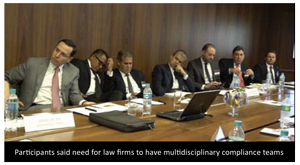Advising on compliance requires multidisciplinary legal teams
The economic conditions in some Latin American countries mean that it is vital that businesses have credible compliance programmes

Law firms in Latin America need to create multidisciplinary teams in order to effectively advise clients on the issue of compliance, attendees at a recent Iberian Lawyer event in Rio de Janeiro heard. Participants were told that businesses operating in Latin America have a great need for effective compliance programmes, especially given the economic climate in some countries in the region.
Citing the example of Brazil, one speaker highlighted the country’s fragile economy – due to a perfect storm of bad economic policies, low commodity prices, high interest rates and low consumption – and consequently, it is important that companies have good and credible compliance programmes. “It is a tough environment for everyone in Brazil – with the high cost of capital, depressed economy and political turmoil – but there is comfort in the fact that democratic institutions (including the independent judiciary, police, press and Congress) are showing to be solid and credible,” said Pedro Aguiar de Freitas, partner at Veirano Advogados. He added that sound compliance programmes are an essential requirement if companies want access to finance an equity investment, as well as do business with reputable partners. In addition, they are also vital for companies that want to stand up to scrutiny from regulators, consumers, communities and other stakeholders.
The onus is on law firms to meet the demand for compliance advice from clients, event participants heard. Aguiar de Freitas said: “We are busy doing compliance related investigative work – we have a team for investigations, beginning with the competition lawyers who have been doing this for a long time. He added that the team also includes corporate lawyers, criminal lawyers, tax and labour lawyers. “This work requires multidisciplinary teams and a good understanding of the business of the client and good interpersonal relationships, so as to avoid disrupting the business environment of the company,” Aguiar de Freitas added.
 The need for law firms to create multidisciplinary compliance teams is a widely-held view in many Latin American countries. “In Peru, there is a big discussion now regarding compliance – right now there is criminal liability for individuals engaged in corruption but now there´s a bill which will be passed very soon creating criminal liabilities for companies,” said Luis Carlos Rodrigo Prado, managing partner of Rodrigo Elias & Medrano. “You need to approach these matters in a very comprehensive way, in our case the compliance practice is led by a criminal law partner and a corporate partner.”
The need for law firms to create multidisciplinary compliance teams is a widely-held view in many Latin American countries. “In Peru, there is a big discussion now regarding compliance – right now there is criminal liability for individuals engaged in corruption but now there´s a bill which will be passed very soon creating criminal liabilities for companies,” said Luis Carlos Rodrigo Prado, managing partner of Rodrigo Elias & Medrano. “You need to approach these matters in a very comprehensive way, in our case the compliance practice is led by a criminal law partner and a corporate partner.”
Juan Carlos Rocha, Bogota-based partner at Philippi Prietocarrizosa & Uría, echoed the view that compliance teams need to be multidisciplinary. “In Colombia, compliance is slightly different – it is primarily focused on anticorruption, and second on environmental law, while transparency in listed companies is another area of focus,” he said. Rocha added: “While in Colombia we never produced our own set of regulations such as the Foreign Corrupt Practices Act, we are struggling with our clients and our legal environment to apply those regulations and principles from Europe and the USA – we need to ´tropicalise´ compliance.”
According to Daniel del Rio, senior partner at Basham, multinationals doing business in Mexico have their own compliance programmes well established “otherwise someone higher up will make them behave”. However, he added that, it can be difficult to convince Mexican companies of the benefits of compliance programmes unless they are already in trouble.

















